Rob Nunn's Blog: Interesting Though Elementary, page 17
May 10, 2020
Interesting Interview: Burt Wolder
If you've met Burt Wolder in person, you've been lucky enough to spend time with one of the nicest men in Sherlockiana. Burt has been a Sherlockian for over fifty years, and he seems delighted with every Sherlockian topic he comes across. Whether he's giving hilariously bad answers to the Canonical Couplet on I Hear of Sherlock Everywhere, or dazzling you with his deep knowledge of the week's given topic on Trifles, Burt is a pleasure to spend time with. And I was lucky enough to get him to say a few words about our hobby for this month's Interesting Interview.

How do you define the word “Sherlockian”?
I think it’s like any other passion, interest or hobby, any other specialty. You would expect coin collectors, numismatists, for example, to know other collectors, to read journals about collecting, to understand the arcana of mints, issues, designs, medallic art. You would expect people with a passion for art or oil painting or for the piano to know the groundbreakers, the virtuosos in the field, to know about the turning points, the innovations, the great moments. To know things that will not be general knowledge. A Sherlockian is someone with all those characteristics, but with a particular focus on the world’s first consulting detective, on the records of his cases and sometimes on the people who make up the community that’s grown up around all that. It’s a very elastic term, and can encompass people who collect Victorian antiques, or manuscripts, or illustrations, or first editions, or who write their own fan fiction, or who might have a couple of Inverness coats or caped-back ulsters in their closets
How did you become a Sherlockian?
By reading, which some people might think is the only way to become a Sherlockian, but it’s not so. Over the years Scott Monty and I have spoken to several people whose first connection with Sherlock Holmes was through a cartoon or a movie or comic book. I became an enthusiast at the moment I discovered there was such a thing as being an enthusiast, and that there were other enthusiasts. It was after the Baring-Gould annotated was published. I don’t remember any of my school friends who were particularly interested. I had first read the stories when I was in the fifth grade. Julian Wolff put me in contact with Steve Clarkson, who helped me connect with people of my own age in my area, so he made my first connections.
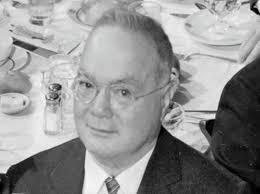
What is your favorite canonical story?
Well, that depends on your criteria for selecting a favorite. When I was first reading the cases the ones that had the greatest impact on me were “The Speckled Band,” because of the snake; “The Red-Headed League,” just for the fun of it; The Hound of the Baskervilles, because it such a great story, and “The Final Problem” because it was so sad, and because of the Paget illustrations. I also loved The Sign of the Four — who could resist a peg-legged villain and an Andaman Islander, apparently wandering around London with nobody noticing? One of the cases that I have the greatest respect for today as a more informed adult is The Valley of Fear, because I think Conan Doyle was at the top of his game at that point.
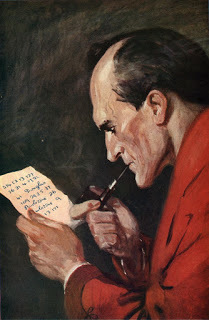
Who is a specific Sherlockian that you think others would find interesting?
It’s harder to find a Sherlockian who isn’t interesting. In the last few years we’ve had books about Bliss Austin, and Vincent Starrett has been widely written about, and soon we will have a book about Julian Wolff. There has been much written about John Bennett Shaw, and Chris Morley was an amazing character. Marina Stajic, a toxicologist and a great writer, is interesting. We have to count Helene Yuhasova, the poet laureate of the BSI, as a Sherlockian, and her story is interesting. An old friend, Chris Steinbrunner, has been in my thoughts this week, along with Robert L. Fish; Bob Fish wrote the Schlock Holmes stories, and a good deal else. My friend Albert Silverstein is interesting: he was one of the last children evacuated to England from Austria, put on a train by his parents when he was about four years old as part of the Kindertransport rescue program. Did I mention Susan Rice and Evy Herzog? They are interesting, great writers and great Sherlockians. Hey, how about you? You’re interesting.
What subset of Sherlockiana really interests you?
I’m really interested in everything on the subject to some degree, but I suppose my big interests are around research, writing, papers, comedies, plays, art and illustration, and on Conan Doyle. And interviews, or at least just talking about Sherlock Holmes, which is something that Scott Monty and I have done for an astonishingly long time through our podcasts.
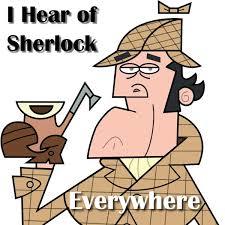
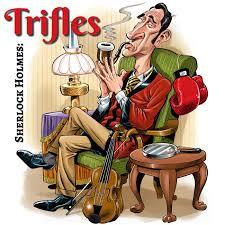
What things do you like to research related to Sherlock Holmes?
Anything, as long as I can figure out a research path. I was delighted to be asked to write a chapter in Trenches: The War Service Of Sherlock Holmes about Holmes’s experiences as Altamont, and about Irish secret societies. For a forthcoming book I just completed an essay on the Royal Navy and the Admiralty in the Victorian and Edwardian eras. I wrote about BSI members and horse racing Upon the Turf: Horse Racing and the Sherlockian Canon. And I am just starting a new essay on Holmes’s return from the Great Hiatus and how his new cases were presented to the public. I jump at any chance to spend time at the New York Public Library.
You were part of the influx of young Sherlockians in the 60's and 70's. What was it like being part of that community?
It was great fun, but it was a blur. I was a shy kid and very much in awe of people like Julian Wolff and the other adults who were then prominent in The Baker Street Irregulars. I had a lot of fun with Andy Page, but he was light years ahead of me in Sherlockian scholarship.
I Hear of Sherlock has been cranking out episodes for 13 years now. How did it all get started?
It was timely. Audio equipment, radio, old time radio, sound recording and editing, all these things had been hobbies of mine since I had been a teenager, but this was a new medium, a whole new toolkit, with digital audio and the internet. It’s something that Scott Monty and I began talking about. We were both early fans of podcasts, and it seemed to us that there was a lot to talk about when it came to Sherlock Holmes. And that was before the BBC Sherlock and the latest renaissance.
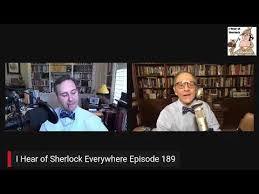
What book would you recommend to other Sherlockians?
Just one book? I suppose I have to cheat and say any annotated addition, Les Klinger’s most recent set, or the Sherlock Holmes Reference Library, or the Baring-Gould annotated, if I can get away with classifying those as just one book. Beyond that, I suppose I’d have to recommend The Grand Game, which gathered really great Sherlockian scholarship in two volumes. For sheer enjoyment I recommend Michael Dirda’s On Conan Doyle – Or the Whole Art of Storytelling all the time to people I suspect of being great readers.
Where do you see Sherlockiana in 5 or 10 years from now?
Flourishing in ways unexpected, I’ll bet. I don’t know that the past has much predictive value, except at a high level. Popular culture will still be important, and popular culture and Sherlock Holmes will have moved on unpredictably. I am looking forward to it. I’m optimistic.
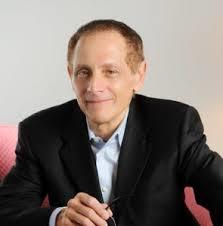

How do you define the word “Sherlockian”?
I think it’s like any other passion, interest or hobby, any other specialty. You would expect coin collectors, numismatists, for example, to know other collectors, to read journals about collecting, to understand the arcana of mints, issues, designs, medallic art. You would expect people with a passion for art or oil painting or for the piano to know the groundbreakers, the virtuosos in the field, to know about the turning points, the innovations, the great moments. To know things that will not be general knowledge. A Sherlockian is someone with all those characteristics, but with a particular focus on the world’s first consulting detective, on the records of his cases and sometimes on the people who make up the community that’s grown up around all that. It’s a very elastic term, and can encompass people who collect Victorian antiques, or manuscripts, or illustrations, or first editions, or who write their own fan fiction, or who might have a couple of Inverness coats or caped-back ulsters in their closets
How did you become a Sherlockian?
By reading, which some people might think is the only way to become a Sherlockian, but it’s not so. Over the years Scott Monty and I have spoken to several people whose first connection with Sherlock Holmes was through a cartoon or a movie or comic book. I became an enthusiast at the moment I discovered there was such a thing as being an enthusiast, and that there were other enthusiasts. It was after the Baring-Gould annotated was published. I don’t remember any of my school friends who were particularly interested. I had first read the stories when I was in the fifth grade. Julian Wolff put me in contact with Steve Clarkson, who helped me connect with people of my own age in my area, so he made my first connections.

What is your favorite canonical story?
Well, that depends on your criteria for selecting a favorite. When I was first reading the cases the ones that had the greatest impact on me were “The Speckled Band,” because of the snake; “The Red-Headed League,” just for the fun of it; The Hound of the Baskervilles, because it such a great story, and “The Final Problem” because it was so sad, and because of the Paget illustrations. I also loved The Sign of the Four — who could resist a peg-legged villain and an Andaman Islander, apparently wandering around London with nobody noticing? One of the cases that I have the greatest respect for today as a more informed adult is The Valley of Fear, because I think Conan Doyle was at the top of his game at that point.

Who is a specific Sherlockian that you think others would find interesting?
It’s harder to find a Sherlockian who isn’t interesting. In the last few years we’ve had books about Bliss Austin, and Vincent Starrett has been widely written about, and soon we will have a book about Julian Wolff. There has been much written about John Bennett Shaw, and Chris Morley was an amazing character. Marina Stajic, a toxicologist and a great writer, is interesting. We have to count Helene Yuhasova, the poet laureate of the BSI, as a Sherlockian, and her story is interesting. An old friend, Chris Steinbrunner, has been in my thoughts this week, along with Robert L. Fish; Bob Fish wrote the Schlock Holmes stories, and a good deal else. My friend Albert Silverstein is interesting: he was one of the last children evacuated to England from Austria, put on a train by his parents when he was about four years old as part of the Kindertransport rescue program. Did I mention Susan Rice and Evy Herzog? They are interesting, great writers and great Sherlockians. Hey, how about you? You’re interesting.
What subset of Sherlockiana really interests you?
I’m really interested in everything on the subject to some degree, but I suppose my big interests are around research, writing, papers, comedies, plays, art and illustration, and on Conan Doyle. And interviews, or at least just talking about Sherlock Holmes, which is something that Scott Monty and I have done for an astonishingly long time through our podcasts.


What things do you like to research related to Sherlock Holmes?
Anything, as long as I can figure out a research path. I was delighted to be asked to write a chapter in Trenches: The War Service Of Sherlock Holmes about Holmes’s experiences as Altamont, and about Irish secret societies. For a forthcoming book I just completed an essay on the Royal Navy and the Admiralty in the Victorian and Edwardian eras. I wrote about BSI members and horse racing Upon the Turf: Horse Racing and the Sherlockian Canon. And I am just starting a new essay on Holmes’s return from the Great Hiatus and how his new cases were presented to the public. I jump at any chance to spend time at the New York Public Library.
You were part of the influx of young Sherlockians in the 60's and 70's. What was it like being part of that community?
It was great fun, but it was a blur. I was a shy kid and very much in awe of people like Julian Wolff and the other adults who were then prominent in The Baker Street Irregulars. I had a lot of fun with Andy Page, but he was light years ahead of me in Sherlockian scholarship.
I Hear of Sherlock has been cranking out episodes for 13 years now. How did it all get started?
It was timely. Audio equipment, radio, old time radio, sound recording and editing, all these things had been hobbies of mine since I had been a teenager, but this was a new medium, a whole new toolkit, with digital audio and the internet. It’s something that Scott Monty and I began talking about. We were both early fans of podcasts, and it seemed to us that there was a lot to talk about when it came to Sherlock Holmes. And that was before the BBC Sherlock and the latest renaissance.

What book would you recommend to other Sherlockians?
Just one book? I suppose I have to cheat and say any annotated addition, Les Klinger’s most recent set, or the Sherlock Holmes Reference Library, or the Baring-Gould annotated, if I can get away with classifying those as just one book. Beyond that, I suppose I’d have to recommend The Grand Game, which gathered really great Sherlockian scholarship in two volumes. For sheer enjoyment I recommend Michael Dirda’s On Conan Doyle – Or the Whole Art of Storytelling all the time to people I suspect of being great readers.
Where do you see Sherlockiana in 5 or 10 years from now?
Flourishing in ways unexpected, I’ll bet. I don’t know that the past has much predictive value, except at a high level. Popular culture will still be important, and popular culture and Sherlock Holmes will have moved on unpredictably. I am looking forward to it. I’m optimistic.

Published on May 10, 2020 18:52
May 3, 2020
It Was a Piteous Business [BLAN]
"The Adventure of the Blanched Soldier" is bogus. Not only was it not written by Sherlock Holmes, but I’ll argue that it is a completely made up tale.
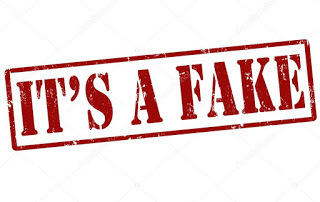
For decades, Holmes had dismissed Watson’s colorful way of writing his series of tales. Sherlock Holmes was a clinical writer. The Distinction between the Ashes of the Various Tobaccos. The Variety of the Human Ear. The tracing of footsteps, with some remarks upon the uses of plaster of Paris as a preserver of impresses. The Polyphonic Motets of Lassus. The influence of a trade upon the form of the hand. We are expected to believe that the writer of such monographs, some of which were said by experts to be the last word upon the subject, is now a chronicler of detective stories? Pfft.
“The Blanched Soldier” was published in 1926. By this time, Holmes was at least twenty years into his retirement on the Sussex Downs. It is very unlikely that at this stage in life, around the age of 70, he would start to record cases.
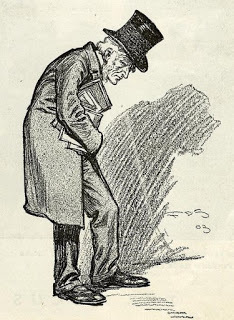
Plus, Holmes frequently credits Watson as a companion. Could we believe that he would call Watson one “to whom the future is always a closed book”? That seems too caustic for even Holmes.
And speaking of Watson, in BLAN Holmes says that “Watson was enabled to produce his meretricious finales… by concealing such links in the chain.” Holmes does the exact same thing here by hiding his dermatologist friend until the big reveal at the end, not letting the reader in to the necessary facts of the case. Sure Holmes has a flair for the dramatic in real life, but none of his writings show such a manner.
According to E.W. McGinley in The Firearms of Sherlock Holmes, “anyone hit in the shoulder by an elephant bullet should have lost his arm and a good part of his shoulder.” The fact that Emsworth was barely injured by such a weapon seems preposterous.
 This is an elephant bullet. Emsworth had a small injury from it. Riiiiiiight....
This is an elephant bullet. Emsworth had a small injury from it. Riiiiiiight....
And doesn’t it seem just a little too convenient that Holmes has a dermatologist on call when he supposes that someone is suffering from leprosy? And that Emsworth's disease could be misdiagnosed as leprosy after he had been to a leper colony? Holmes is quick to dismiss coincidences in A Study in Scarlet, “The Speckled Band,” and “Silver Blaze,” but when Dr. Saunders chalks Emsworth’s diagnosis up to a coincidence, he just rolls with it.
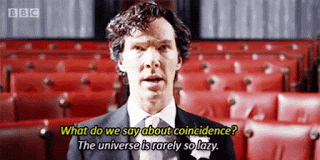
And Dr. Saunders provides quite the happy ending here. The Canon is full of adventures that don’t end in happy endings. “The Greek Interpreter,” “The Five Orange Pips,” The Valley of Fear, and “The Dancing Men” just off the top of my head. I’m sure we could brainstorm plenty more. “The Blanched Soldier’s” fairy tale ending is just too much to accept.
But the final nail in the coffin for me is Holmes’s maxim that is shoehorned into the story: “That process starts upon the supposition that when you have eliminated all which is impossible, then whatever remains, however improbable, must be the truth.” Holmes’s further explanation that he has ruled out crime and insanity is pretty flimsy. Based off of the scant evidence of James Dodd’s two fleeting glimpses of his friend and his minuscule knowledge of the family and surrounding area, leprosy is a significant conclusion to jump to. Whoever the author of this story is, they wanted Holmes’s famous impossible/improbable phrase in here, whether it made sense or not.
We are expected to believe all of these things, but “The Blanched Soldier” falls very short of the quality of Sherlock Holmes adventure that we have come to expect. To cover up for this, the author has tried to convince us that it was written by Holmes himself, which is nonsense. You may as tell me that it was written by a failed ophthalmologist from Portsmouth. That would be just as believable.
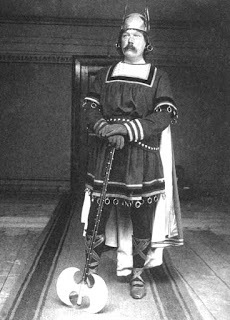

For decades, Holmes had dismissed Watson’s colorful way of writing his series of tales. Sherlock Holmes was a clinical writer. The Distinction between the Ashes of the Various Tobaccos. The Variety of the Human Ear. The tracing of footsteps, with some remarks upon the uses of plaster of Paris as a preserver of impresses. The Polyphonic Motets of Lassus. The influence of a trade upon the form of the hand. We are expected to believe that the writer of such monographs, some of which were said by experts to be the last word upon the subject, is now a chronicler of detective stories? Pfft.
“The Blanched Soldier” was published in 1926. By this time, Holmes was at least twenty years into his retirement on the Sussex Downs. It is very unlikely that at this stage in life, around the age of 70, he would start to record cases.

Plus, Holmes frequently credits Watson as a companion. Could we believe that he would call Watson one “to whom the future is always a closed book”? That seems too caustic for even Holmes.
And speaking of Watson, in BLAN Holmes says that “Watson was enabled to produce his meretricious finales… by concealing such links in the chain.” Holmes does the exact same thing here by hiding his dermatologist friend until the big reveal at the end, not letting the reader in to the necessary facts of the case. Sure Holmes has a flair for the dramatic in real life, but none of his writings show such a manner.
According to E.W. McGinley in The Firearms of Sherlock Holmes, “anyone hit in the shoulder by an elephant bullet should have lost his arm and a good part of his shoulder.” The fact that Emsworth was barely injured by such a weapon seems preposterous.
 This is an elephant bullet. Emsworth had a small injury from it. Riiiiiiight....
This is an elephant bullet. Emsworth had a small injury from it. Riiiiiiight....And doesn’t it seem just a little too convenient that Holmes has a dermatologist on call when he supposes that someone is suffering from leprosy? And that Emsworth's disease could be misdiagnosed as leprosy after he had been to a leper colony? Holmes is quick to dismiss coincidences in A Study in Scarlet, “The Speckled Band,” and “Silver Blaze,” but when Dr. Saunders chalks Emsworth’s diagnosis up to a coincidence, he just rolls with it.

And Dr. Saunders provides quite the happy ending here. The Canon is full of adventures that don’t end in happy endings. “The Greek Interpreter,” “The Five Orange Pips,” The Valley of Fear, and “The Dancing Men” just off the top of my head. I’m sure we could brainstorm plenty more. “The Blanched Soldier’s” fairy tale ending is just too much to accept.
But the final nail in the coffin for me is Holmes’s maxim that is shoehorned into the story: “That process starts upon the supposition that when you have eliminated all which is impossible, then whatever remains, however improbable, must be the truth.” Holmes’s further explanation that he has ruled out crime and insanity is pretty flimsy. Based off of the scant evidence of James Dodd’s two fleeting glimpses of his friend and his minuscule knowledge of the family and surrounding area, leprosy is a significant conclusion to jump to. Whoever the author of this story is, they wanted Holmes’s famous impossible/improbable phrase in here, whether it made sense or not.
We are expected to believe all of these things, but “The Blanched Soldier” falls very short of the quality of Sherlock Holmes adventure that we have come to expect. To cover up for this, the author has tried to convince us that it was written by Holmes himself, which is nonsense. You may as tell me that it was written by a failed ophthalmologist from Portsmouth. That would be just as believable.

Published on May 03, 2020 10:51
April 19, 2020
The Oaths and Secrets of This Brotherhood [REDC]
At the end of "The Red Circle," Holmes calls Emilia Lucca out of hiding and she sees that she is finally safe from Giuseppe Gorgiano of the Red Circle, a brotherhood allied to the old Carbonari. Through Mrs. Lucca's backstory, we learn that the Red Circle was a society well-versed in blackmail, violence, and murder.
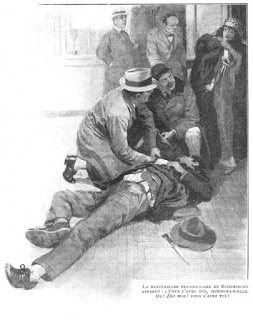
Inspector Gregson takes Mrs. Lucca to see his chief to check out her story, the American Pinkerton agent is satisfied that his prey is dead, Holmes and Watson head off to the opera, and everyone lives happily ever after.
Unless you were one of the nameless individuals terrorized by this society.
Holmes showed no interest in addressing this organization and their crimes. One could imagine that they were a deep organizing power that pervaded society, made up of numerous and organized agents. We've seen Holmes take on a force like this before, the Moriarty gang.
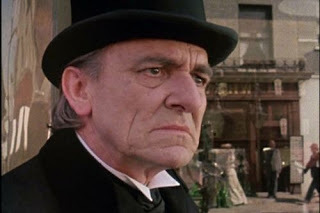
So why did Holmes dismiss this organization? Was it because Gorgiano was the only active member in London and they did not threaten Holmes's city? I disagree with that.
In "The Six Napoleons," we hear of Pietro Venucci, one of the greatest cut-throats in London. And according to Lestrade, Venucci is connected with the Mafia.
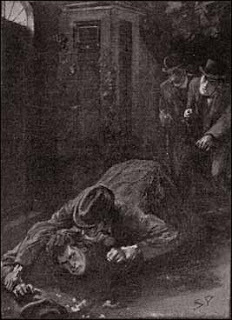
Most chronologists agree that SIXN takes place in 1900, but the dates for REDC are all over the map, ranging between 1893 and 1903, so SIXN would be, at most, a few years off from REDC. And a few years would be plenty of time for a criminal organization to create a stronghold in London, especially after the hole left once Moriarty's organization crumpled in 1891. So the dates work.
But the word "Mafia" is never mentioned in REDC, and it's cavalier to paint all Italian criminals with such a broad brush.
So let's look at the ORIGINAL texts.
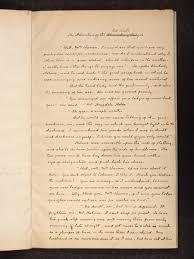
Some changes were made to the manuscripts before they saw publication. In REDC, "The Red Circle" was originally called "The Black Hand" and it's allegiant organization "the old Carbonari" was originally "the famous Camorra." Both of these original names were true-to-life criminal organizations at the time. In SIXN, Pietro Venucci was said to be from Florence. But in the original text, he was from Naples. The organization Watson called the Red Circle was also located in Naples.
I think we have at least enough evidence to argue that an Italian criminal organization was working in London around the turn of the century. So why would Sherlock Holmes walk away from both of these cases without further investigation into the larger society connected to them?
Maybe he did, and for whatever reason those facts were withheld from us. Maybe Holmes recognized that this organization spanned continents and wasn't one that he could address on his own. Or maybe somebody made him an offer he couldn't refuse.
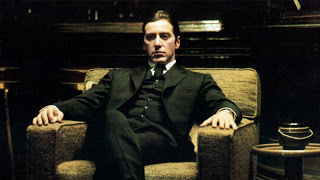

Inspector Gregson takes Mrs. Lucca to see his chief to check out her story, the American Pinkerton agent is satisfied that his prey is dead, Holmes and Watson head off to the opera, and everyone lives happily ever after.
Unless you were one of the nameless individuals terrorized by this society.
Holmes showed no interest in addressing this organization and their crimes. One could imagine that they were a deep organizing power that pervaded society, made up of numerous and organized agents. We've seen Holmes take on a force like this before, the Moriarty gang.

So why did Holmes dismiss this organization? Was it because Gorgiano was the only active member in London and they did not threaten Holmes's city? I disagree with that.
In "The Six Napoleons," we hear of Pietro Venucci, one of the greatest cut-throats in London. And according to Lestrade, Venucci is connected with the Mafia.

Most chronologists agree that SIXN takes place in 1900, but the dates for REDC are all over the map, ranging between 1893 and 1903, so SIXN would be, at most, a few years off from REDC. And a few years would be plenty of time for a criminal organization to create a stronghold in London, especially after the hole left once Moriarty's organization crumpled in 1891. So the dates work.
But the word "Mafia" is never mentioned in REDC, and it's cavalier to paint all Italian criminals with such a broad brush.
So let's look at the ORIGINAL texts.

Some changes were made to the manuscripts before they saw publication. In REDC, "The Red Circle" was originally called "The Black Hand" and it's allegiant organization "the old Carbonari" was originally "the famous Camorra." Both of these original names were true-to-life criminal organizations at the time. In SIXN, Pietro Venucci was said to be from Florence. But in the original text, he was from Naples. The organization Watson called the Red Circle was also located in Naples.
I think we have at least enough evidence to argue that an Italian criminal organization was working in London around the turn of the century. So why would Sherlock Holmes walk away from both of these cases without further investigation into the larger society connected to them?
Maybe he did, and for whatever reason those facts were withheld from us. Maybe Holmes recognized that this organization spanned continents and wasn't one that he could address on his own. Or maybe somebody made him an offer he couldn't refuse.

Published on April 19, 2020 17:46
April 14, 2020
Interesting Interview: Susan Rice
Susan Rice is a cornerstone in Sherlockiana. She created and oversaw one of the major societies for young people to enjoy Sherlock Holmes decades ago. She was part of the first group of women to be inaugurated into the BSI in 1991. She has overseen the William Gillette Memorial Luncheon during the birthday weekend for a looooong time. She's put out more than a few books, articles, and writings that should be in all of our collections. Oh, and she just might be the nicest Sherlockian I've ever met. And that's setting the bar really high. So even if we can't visit in person right now, we can spend some time with Susan as she gives us this month's Interesting Interview:
University of Minnesota symposium in 2013
How do you define the word “Sherlockian”?
All those who love Sherlock Holmes, especially those who turn to the Canon. They can come from a television or movie Holmes, they can come from a pastiche or play or even a Classic Comic, but as an orthodox Sherlockian (my own description, used only by me) I feel they must read the original sixty stories.
How did you become a Sherlockian?
Every Sherlockian is self-created. When she or he reads the first story in school or in a book picked up because they like the cover, something clicks in their minds and they immediately want more. My own story must be pretty typical. As a child I loved reading mysteries, so the Christmas when I'd just turned eleven or twelve (I can't remember for sure) I found The Complete Sherlock Holmes under the Christmas tree, I opened it and started reading "in Memoriam", the introduction by Christopher Morley, and became so entranced that I forgot the other packages that remained unopened. I had to be called back to consciousness by my parents and opened the rest of the presents, but as soon as breakfast was over I picked up the big volume and carried it up to my room to read. I've never stopped reading it.
What is your favorite canonical story?
The Hound of the Baskervilles
Who is a specific Sherlockian that you think others would find interesting?
At least a dozen remarkable people come to mind, but I have whittled them down to three, and all have passed beyond the Reichenbach now.
Ely Liebow was a man who combined depth and scholarship and a wry sense of humor into an irresistible package. He was a true philosopher and a completely honorable person, and a long conversation with Ely was sheer pleasure. He wrote the definitive biography of Dr. Joseph Bell, the man Conan Doyle named as his model for Holmes.
Joe Fink was a student of the impossible. He wrote pieces on the worm unknown to science, the society of short people, Tapanuli mute opera, each of which he would deliver with a deadpan face and would look up startled when his audience became lost in guffaws. I've seen him take out a pencil and underline a sentence that was greeted with laughter, which doubled the giggles and left his listeners helpless. He was a very funny man.
Another funny Sherlockian with an antic sense of the absurd was Bill Rabe. He took the opportunity to eliminate from the English language certain words because they were overused or awkward, and his opinion was printed in hundreds of newspapers. He invented a silent record so those who craved a stop to the loud music had a genuine choice on jukeboxes. He was a brilliant jokester, and many of his crazy schemes continue long after his death.
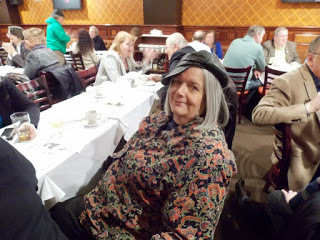
What subset of Sherlockiana really interests you?
As an orthodox Sherlockian (one devoted to the original adventures), I prefer to read and write about canonical matters. Starting from a canonical point, however, can take you far afield, so this is not limiting. I have studied and written on Victorian beekeeping, about the politics in Asia involving Britain and Russia in the 1890s called the Great Game, and the battle for women's suffrage in turn-of-the-century London.
What things do you like to research related to Sherlock Holmes?
Some of those are demonstrated above. As a feminist, who sincerely believes Holmes is a feminist, too, even in the Victorian Era, I have researched women's suffrage in England. I wondered why Holmes had retired from consulting detective at the age of 50 to become a beekeeper, so I did a lot of research on beekeeping and found it full of mysteries in that period (and some still unsolved today) and discovered it was the perfect second life for Holmes. That essay became so long that it was published as a book called A Compound of Excelsior.
A British society commissioned me to write a book about my favorite Sherlockian writer, Vincent Starrett -- it was called The Somnambulist and the Detective. One long piece in the BSJ was the result of a challenge from a fellow Holmesian who knew I was in the travel business and asked if I could look back in that field to trace Holmes's journey during the Great Hiatus, the three years (1891 - 1894) when he was absent from London.
You've been an active Sherlockian for over 50 years. What are some of your fondest memories from along the way?
My first scion society was the one we formed in 1969 with former students called The Trifling Monographs. I taught fifth grade at an independent school north of Detroit for seven years, and many former students came back for visits at the end of the school day. Somehow they developed a startling interest in Sherlock Holmes -- ahem, I don't know how that happened.
That scion was not long-lived; I moved to Greece in 1972, and within two years most of the kids were off to college. I first came to the New York City Holmesian birthday festivities in 1977 and haven't missed a year since. I can clearly remember meeting so many of my Sherlockian heroes like John Bennett Shaw, Bob Hahn, and Don Yates and conversing with a great sense of awe. Some years later I suddenly noticed people were treating me that way and it made me feel old. Now that I am old I take great delight in young Sherlockians who will carry the torch into the future.
Susan when she hosted her first Gillette Luncheon during the Birthday Weekend You were one of the leaders of the Young Sherlockian movement of the 70s and 80s. What made you think to introduce Holmes to young people?
It's the perfect time -- eleven or twelve -- to discover the joys of the sixty tales. It was my time, but for proof, a fine Sherlockian named Christopher Redmond created a survey in the early 80s. He sent paper questionnaires by mail to 100 or so Sherlockians -- this was long before the computer era -- and the average age among adult Sherlockians for their first read of the Canon was (trumpet flourish) twelve!
What book would you recommend to other Sherlockians?
That's an easy question: The Private Life of Sherlock Holmes by Vincent Starrett. It's a collection of pieces Starrett had published in various magazines, so it's not anything like a biography, but each piece is fascinating and offers new trains of thought.
Where do you see Sherlockiana in 5 or 10 years from now?
The BSI and ASH will change very little, but the pastime will migrate online more and more. I truly believe that Sherlockians will continue to be intelligent and creative people who make up a delightful company and are the best of friends. Now that I'm old, I have perhaps fifty or sixty folks who have been good friends for more than forty years. That's a beautiful gift.
With Mickey at our last ASH Wednesday before the quarantine on February 5th
University of Minnesota symposium in 2013
How do you define the word “Sherlockian”?
All those who love Sherlock Holmes, especially those who turn to the Canon. They can come from a television or movie Holmes, they can come from a pastiche or play or even a Classic Comic, but as an orthodox Sherlockian (my own description, used only by me) I feel they must read the original sixty stories.
How did you become a Sherlockian?
Every Sherlockian is self-created. When she or he reads the first story in school or in a book picked up because they like the cover, something clicks in their minds and they immediately want more. My own story must be pretty typical. As a child I loved reading mysteries, so the Christmas when I'd just turned eleven or twelve (I can't remember for sure) I found The Complete Sherlock Holmes under the Christmas tree, I opened it and started reading "in Memoriam", the introduction by Christopher Morley, and became so entranced that I forgot the other packages that remained unopened. I had to be called back to consciousness by my parents and opened the rest of the presents, but as soon as breakfast was over I picked up the big volume and carried it up to my room to read. I've never stopped reading it.
What is your favorite canonical story?
The Hound of the Baskervilles
Who is a specific Sherlockian that you think others would find interesting?
At least a dozen remarkable people come to mind, but I have whittled them down to three, and all have passed beyond the Reichenbach now.
Ely Liebow was a man who combined depth and scholarship and a wry sense of humor into an irresistible package. He was a true philosopher and a completely honorable person, and a long conversation with Ely was sheer pleasure. He wrote the definitive biography of Dr. Joseph Bell, the man Conan Doyle named as his model for Holmes.
Joe Fink was a student of the impossible. He wrote pieces on the worm unknown to science, the society of short people, Tapanuli mute opera, each of which he would deliver with a deadpan face and would look up startled when his audience became lost in guffaws. I've seen him take out a pencil and underline a sentence that was greeted with laughter, which doubled the giggles and left his listeners helpless. He was a very funny man.
Another funny Sherlockian with an antic sense of the absurd was Bill Rabe. He took the opportunity to eliminate from the English language certain words because they were overused or awkward, and his opinion was printed in hundreds of newspapers. He invented a silent record so those who craved a stop to the loud music had a genuine choice on jukeboxes. He was a brilliant jokester, and many of his crazy schemes continue long after his death.

What subset of Sherlockiana really interests you?
As an orthodox Sherlockian (one devoted to the original adventures), I prefer to read and write about canonical matters. Starting from a canonical point, however, can take you far afield, so this is not limiting. I have studied and written on Victorian beekeeping, about the politics in Asia involving Britain and Russia in the 1890s called the Great Game, and the battle for women's suffrage in turn-of-the-century London.
What things do you like to research related to Sherlock Holmes?
Some of those are demonstrated above. As a feminist, who sincerely believes Holmes is a feminist, too, even in the Victorian Era, I have researched women's suffrage in England. I wondered why Holmes had retired from consulting detective at the age of 50 to become a beekeeper, so I did a lot of research on beekeeping and found it full of mysteries in that period (and some still unsolved today) and discovered it was the perfect second life for Holmes. That essay became so long that it was published as a book called A Compound of Excelsior.
A British society commissioned me to write a book about my favorite Sherlockian writer, Vincent Starrett -- it was called The Somnambulist and the Detective. One long piece in the BSJ was the result of a challenge from a fellow Holmesian who knew I was in the travel business and asked if I could look back in that field to trace Holmes's journey during the Great Hiatus, the three years (1891 - 1894) when he was absent from London.
You've been an active Sherlockian for over 50 years. What are some of your fondest memories from along the way?
My first scion society was the one we formed in 1969 with former students called The Trifling Monographs. I taught fifth grade at an independent school north of Detroit for seven years, and many former students came back for visits at the end of the school day. Somehow they developed a startling interest in Sherlock Holmes -- ahem, I don't know how that happened.
That scion was not long-lived; I moved to Greece in 1972, and within two years most of the kids were off to college. I first came to the New York City Holmesian birthday festivities in 1977 and haven't missed a year since. I can clearly remember meeting so many of my Sherlockian heroes like John Bennett Shaw, Bob Hahn, and Don Yates and conversing with a great sense of awe. Some years later I suddenly noticed people were treating me that way and it made me feel old. Now that I am old I take great delight in young Sherlockians who will carry the torch into the future.
Susan when she hosted her first Gillette Luncheon during the Birthday Weekend You were one of the leaders of the Young Sherlockian movement of the 70s and 80s. What made you think to introduce Holmes to young people?
It's the perfect time -- eleven or twelve -- to discover the joys of the sixty tales. It was my time, but for proof, a fine Sherlockian named Christopher Redmond created a survey in the early 80s. He sent paper questionnaires by mail to 100 or so Sherlockians -- this was long before the computer era -- and the average age among adult Sherlockians for their first read of the Canon was (trumpet flourish) twelve!
What book would you recommend to other Sherlockians?
That's an easy question: The Private Life of Sherlock Holmes by Vincent Starrett. It's a collection of pieces Starrett had published in various magazines, so it's not anything like a biography, but each piece is fascinating and offers new trains of thought.
Where do you see Sherlockiana in 5 or 10 years from now?
The BSI and ASH will change very little, but the pastime will migrate online more and more. I truly believe that Sherlockians will continue to be intelligent and creative people who make up a delightful company and are the best of friends. Now that I'm old, I have perhaps fifty or sixty folks who have been good friends for more than forty years. That's a beautiful gift.
With Mickey at our last ASH Wednesday before the quarantine on February 5th
Published on April 14, 2020 10:12
April 1, 2020
The Sherlock Holmes Coronavirus Survival Guide
Mark Chellew, President of the Sherlock Holmes Society of South Australia, created the following survival guide. Enjoy!
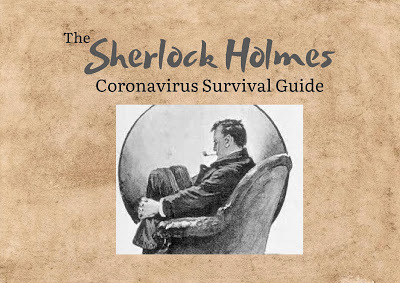


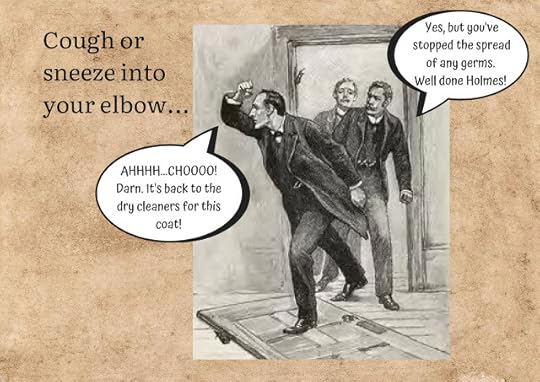
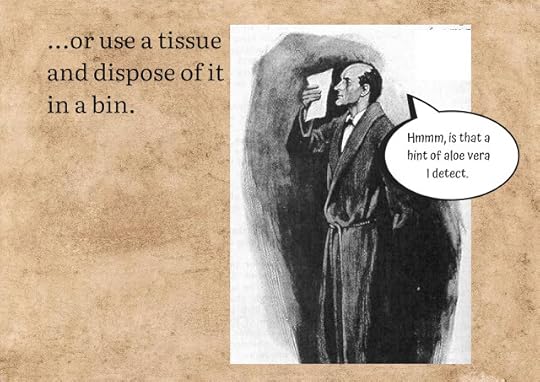
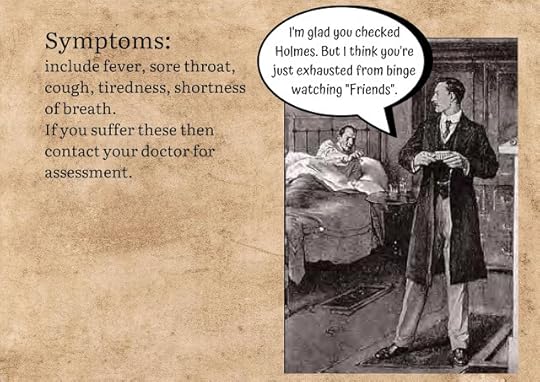
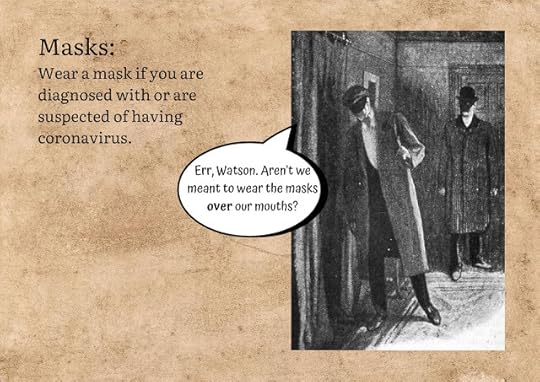
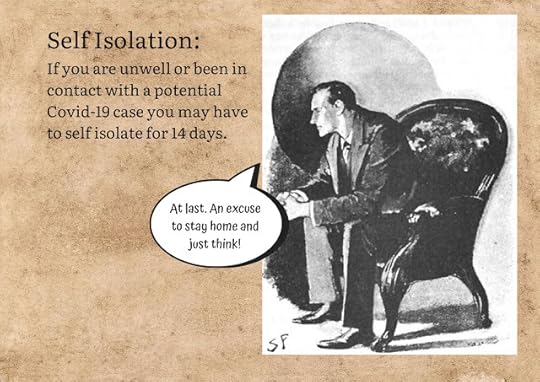
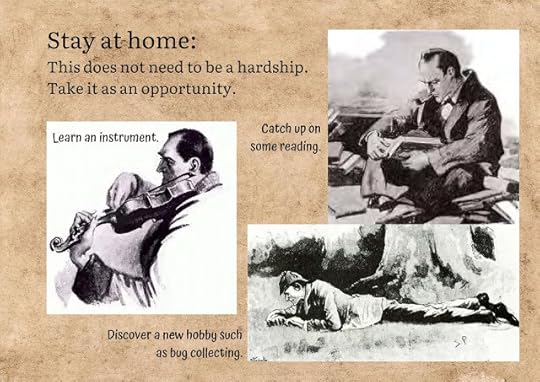

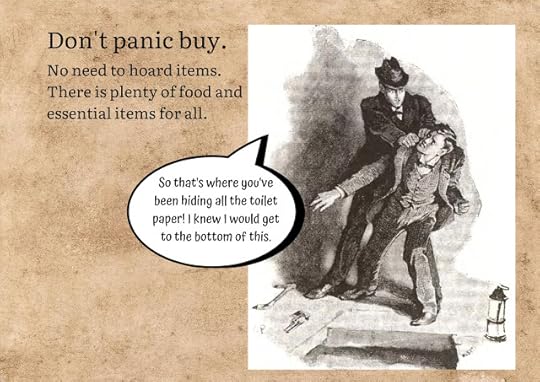

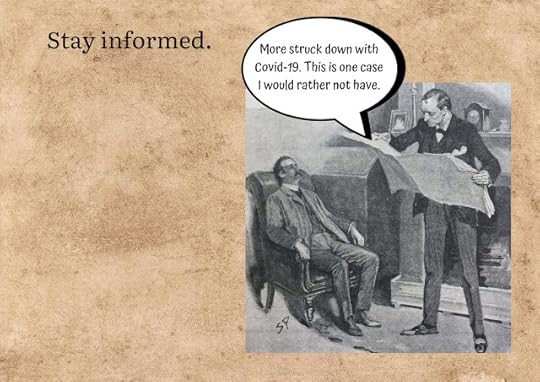

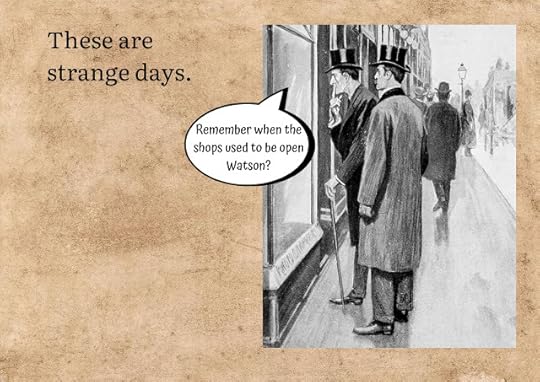
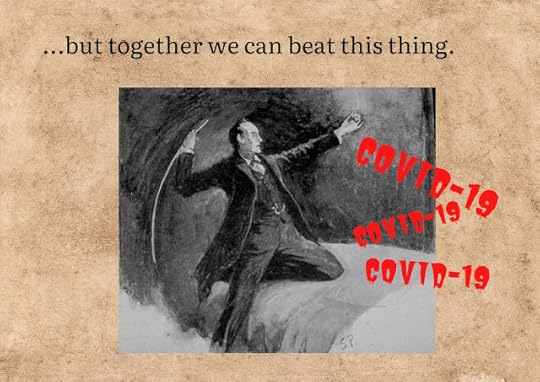

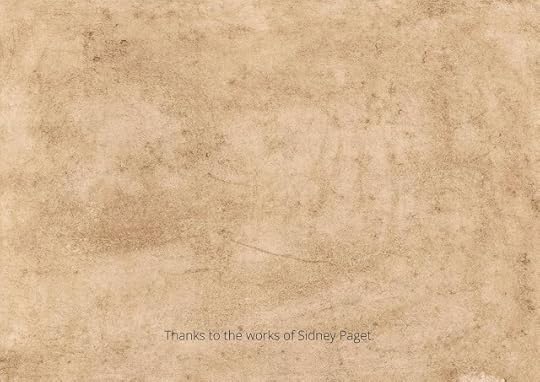


















Published on April 01, 2020 06:52
March 17, 2020
There I Stayed for Some Time [STUD]
Meetings and conferences are getting canceled. Certain staples are hard to find (I scoffed at the people hoarding hand sanitizer and toilet paper, but then I heard my library was closing for three weeks and I suddenly felt that panic). Kids are being sent home from school and everyone's work is being disrupted. I've been thinking about a way to address this new way of life we're looking at for at least the next few weeks, but kept coming up short.
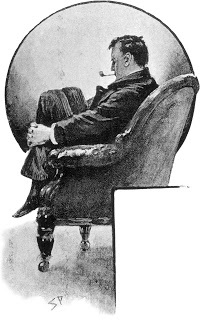
But then, like an articulate knight in shining armor, Bill Mason sent an email to the Welcome Holmes listserv that encapsulated what so many of us are feeling. I wanted to share this with everyone who reads this blog and may not subscribe to that email list because, well, it's just perfect:
Well, by now, this pandemic has had its effect on each and every one of us, including in the enjoyment of our Sherlockian activities. In Nashville, we have cancelled our regular meeting of the Nashville Scholars this Saturday, and the weekly gatherings of the Fresh Rashers of Nashville have been suspended until further notice. Holmes, Doyle and Friends in Dayton has been called off because all the restaurants and bars in Ohio have been closed by the governor--and Sherlockians cannot gather without food and alcohol, or at least I have never heard of such a thing. Notices from around the country about cancelled scion meetings seem to come every day or so.
This is all to be expected, I suppose, under the circumstances. But all such crises have a finite duration, and--hopefully--other events later in the year will still be convened.
Sherlock Holmes, though, will endure, as he always has--he who was never born and so can never die. And Sherlockians, thanks to such blog sites as WelcomeHolmes and literally dozens of others most of us have bookmarked, will continue to play The Game. Most of you are on other forms of social media (I am not), and I suspect you have been active there. In fact, as we control our personal social interactions for a few weeks, our virtual contacts may increase. Our Sherlockian family also will endure.
I have never believed (and current circumstances will not change my opinion) that electronic communication, as wonderful as it can be, will ever adequately substitute for face-to-face, personal interaction in the Sherlockian world. But it is comforting to know that all of you are out there, and I imagine each of you sitting in an armchair beside a fireplace as the elements beat against the bow window, literally and figuratively, just as Holmes and Watson did at 221B Baker Street. And I also like to think of each of you as being safe and well and as anxious to answer the call that "the game is afoot!" as I am.
Wishing each of you the very best.
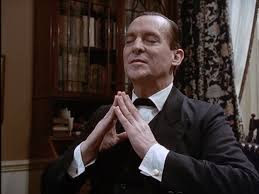

But then, like an articulate knight in shining armor, Bill Mason sent an email to the Welcome Holmes listserv that encapsulated what so many of us are feeling. I wanted to share this with everyone who reads this blog and may not subscribe to that email list because, well, it's just perfect:
Well, by now, this pandemic has had its effect on each and every one of us, including in the enjoyment of our Sherlockian activities. In Nashville, we have cancelled our regular meeting of the Nashville Scholars this Saturday, and the weekly gatherings of the Fresh Rashers of Nashville have been suspended until further notice. Holmes, Doyle and Friends in Dayton has been called off because all the restaurants and bars in Ohio have been closed by the governor--and Sherlockians cannot gather without food and alcohol, or at least I have never heard of such a thing. Notices from around the country about cancelled scion meetings seem to come every day or so.
This is all to be expected, I suppose, under the circumstances. But all such crises have a finite duration, and--hopefully--other events later in the year will still be convened.
Sherlock Holmes, though, will endure, as he always has--he who was never born and so can never die. And Sherlockians, thanks to such blog sites as WelcomeHolmes and literally dozens of others most of us have bookmarked, will continue to play The Game. Most of you are on other forms of social media (I am not), and I suspect you have been active there. In fact, as we control our personal social interactions for a few weeks, our virtual contacts may increase. Our Sherlockian family also will endure.
I have never believed (and current circumstances will not change my opinion) that electronic communication, as wonderful as it can be, will ever adequately substitute for face-to-face, personal interaction in the Sherlockian world. But it is comforting to know that all of you are out there, and I imagine each of you sitting in an armchair beside a fireplace as the elements beat against the bow window, literally and figuratively, just as Holmes and Watson did at 221B Baker Street. And I also like to think of each of you as being safe and well and as anxious to answer the call that "the game is afoot!" as I am.
Wishing each of you the very best.

Published on March 17, 2020 10:55
March 8, 2020
Interesting Interview: Monica Schmidt
If you've been to a Sherlockian event in the past five years, you've probably seen (or had a drink with) Monica Schmidt. Not content with staying home in Iowa, Monica makes her way to as many get-togethers as she can. I've seen her give a few talks (one on book collecting vs. hoarding that made everyone in the room a little nervous) and love when her name pops up in the Baker Street Journal. Monica is a tornado of Sherlockian energy and to meet her is to be swept up in it. So hang on, because here comes the tornado now!
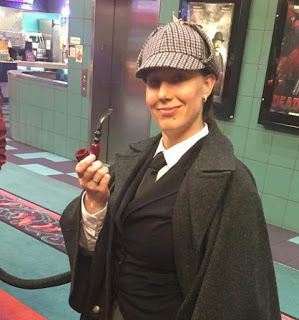
How do you define the word “Sherlockian”?
I’ve been a fan of Sherlock Holmes for more than 30 years and have enjoyed hundreds of different interpretations of the character in various forms of media. For me, the term Sherlockian refers to a particular breed of Sherlock Holmes fan: a student of the Canon whose knowledge is beyond the basic narrative of the stories and engages in the Great Game (which is an exercise in which we critically examine the original texts and make sense of the inconsistencies contained within, how it intersects with the real world, etc.). Based on that definition, I didn't become a "Sherlockian" until my mid/late-teens.
I recognize my definition may not be a popular one because it is a narrower in scope than some would prefer. However, I don’t see the term fan as a pejorative, and in fact, embrace it. I am a fan of lots of things ranging from sports teams (Green Bay Packers), to book series (Harry Potter), to movies (I attend several film festivals annually), and TV shows (especially the BBC sci-fi show, Doctor Who). Fan is a general term for an enthusiast, whereas Sherlockian is a very specific type of fan (kind of like all thumbs are fingers, but not all fingers are thumbs). For many years, I avoided self-applying the term Whovian, (the Doctor Who equivalent of Sherlockian) and referred to myself as a Doctor Who Fan because term/title Whovian implies a level of knowledge surrounding the character and the various facets of the Whoniverse (which extends far beyond the original and new TV series) that I didn’t possess until six or seven years ago.
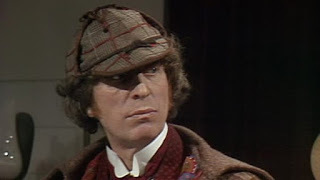
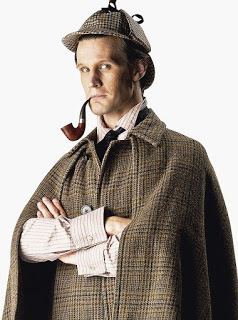
A different, and perhaps more provocative, question might be “What does it mean to you to be a Sherlockian?” And in answering that question, I think it means being part of a long-standing scholarly literary community and tradition that has united people from all demographics in their love of the friendship between the great detective and his Boswell.
How did you become a Sherlockian?
I’ve told the story of how I became a Sherlock Holmes fan many times before: I was introduced to the character through a made-for-TV movie that aired in January 1987: The Return of Sherlock Holmes. My mother made me go to bed midway through the movie (I was 5 ½, after all), but I never forgot the classic pop-culture signifiers of Sherlock Holmes shown in the film. A year or two later, I came across an abridged children’s edition of The Mysteries of Sherlock Holmes on my brother’s bookshelf, which I read over and over again. And then in 1991, I came across Jeremy Brett’s Sherlock Holmes on cable’s A&E. That is when I got really hooked as a fan of the character (and of Jeremy Brett’s portrayal).
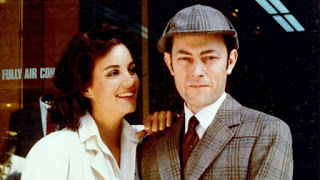
But I didn’t become a Sherlockian until the mid-90’s. One of my junior high teachers, Mrs. Patricia Cox, saw me lugging around a copy of the Canon and suggested I use a search engine on the Internet to research Swamp Adders and Tapanuli fever. When I couldn’t find much information beyond a couple of small entries from obscure scholars and links to the Sherlock Holmes stories, Mrs. Cox introduced me to the concept of the Grand Game and how Sherlockians have sought to engage in scholarly research, trying to make sense of the minutiae in the Canon and explain away the inconsistencies and other facets of the stories. This is what started me down the rabbit hole and, on the path, to becoming a Sherlockian.
What is your favorite canonical story?
The Sign of Four is my favorite. It’s the story I was obsessed with as a teen, in part because I was trying to make sense of Holmes’s use of cocaine/morphine for recreational purposes while observing my eldest brother struggle with his addiction to similar substances. My desire to make sense of Holmes’s use (and consequently, my brother’s use) forced me to go beyond the story and understand the Victorian cultural attitude towards cocaine use compared to the modern American view. I also happened to really like the story.
But there is a special place in my heart for “The Red-Headed League,” “The Blue Carbuncle,” and “The Speckled Band,” as those were the short stories to which I was first exposed as a child.
Who is a specific Sherlockian that you think others would find interesting?
While scouring Wikipedia a while back, I came across Richard H. Hoffmann, BSI (1952, The Beryl Coronet). He was a rather high-profile psychiatrist who treated several notable people for alcohol addiction, which is my specialty within the realm of mental health counseling.
Julie McKuras, BSI, ASH (who is also a Sherlockian I find incredibly interesting) did the vast majority of the heavy lifting on a biographical section on the website of the Vincent Starrett founded Sherlockian society, The Hounds of the Baskerville (sic). If you look through the members section and click the links to the biographical entries, you’ll find a British diplomat whose name appeared in Hitler’s Black Book (W.H. Gallienne), the co-inventor of the polygraph test (Leonarde Keeler), a famous magician (Jay Marshall), and a rather notable author and poet (T.S. Eliot). You’ll also find bio blurbs of some great Sherlockians both past and present on the site.
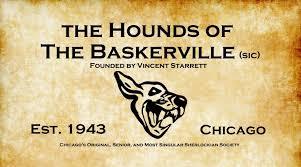
What subset of Sherlockiana really interests you?
Different Sherlockian scions and societies have a large variety of traditions and I am fascinated by learning the history of how they engage with Sherlockiana. Some groups meet once annually, some once (or more) monthly, and one meets only every four years on leap day! Some groups meet at libraries while others have elaborately planned dinners with menus that haven’t changed in decades. Some groups really study their Canon and for others, the Canon almost seems like an afterthought. To me, the how’s and why’s are truly fascinating, as it helps a younger Sherlockian like me gain an understanding and appreciation for those who came before me.
As someone who goes to more Sherlockian events than most, what would be your sales pitch for someone who is on the fence about attending an event?
When you first start out engaging in the more social aspects of the hobby, it can feel incredibly intimidating. You walk into a room filled with people who have known each other for many years and you’re the new person who knows no one; you're a little scared and worried about how you will be perceived. But, go anyway! Sherlockians tend to be some of the most welcoming and nicest people. And the vast majority are very interested in embracing new people to the hobby.
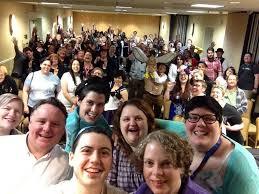
Take an opportunity to introduce yourself. Ask people questions and listen intently to their answers. Be humble, as you are on their turf and are there to learn if it is a good fit for you. If, after attending, you decide that particular group’s style doesn’t mesh with you, that’s totally okay.
Sherlockiana is a lot like the rest of life: you’re not always going to like or fit well with every group you encounter. I encourage you to not give up and to continue your search for groups or events that fit you. For example, I attended 221b Con a couple of years ago, which is more of a sci-fi convention style, fandom-focused event with a bit of traditional Sherlockiana in the mix. It’s a wonderful event and I had a lot of fun, but it’s just not my preferred way to engage with Sherlock Holmes. But that doesn’t mean others should not go and enjoy.
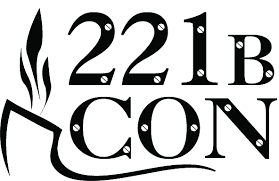
How has your profession as a mental health counselor influenced how you read the Canon? What things do you like to research related to Sherlock Holmes?
My core understanding of the Canon stems from a time well before I was a mental health counselor, so my professional training didn’t really start influencing interpretation of the stories until a few years ago. During BSI weekend in 2014, I had a late-night conversation with Jim Cox in which I was lamenting that so many laymen had weighed in regarding Sherlock Holmes’s use of cocaine and whether he was or was not an addict, and no one had really bothered to consult the clinical criteria. Jim suggested that I write such an essay…and I thought, “Why not?”
That is when I started to examine the Canon through a more clinical lens. Clinically and ethically, I am not allowed to twist facts to suit theories – I am limited in my ability to diagnose by what I can support from either the patient or reliable collaborative information (ex: things Holmes says or Watson observes). Therefore, I examine the text and look for passages that support, or do not support the various criteria of a diagnosis without any pre-conceived notions about the diagnostic conclusions. So, this is why, after examining the text, I learned Holmes meets DSM-5 diagnostic criteria for Cocaine Use Disorder, Severe and Watson does not meet the criteria for Problem Gambling Disorder.
Dorothy L. Sayers once wrote that the game "must be played as solemnly as a county cricket match at Lord's; the slightest touch of extravagance or burlesque ruins the atmosphere.” I’ve tried to embrace that philosophy, taking my Canonical scholarship seriously, but also welcoming dissenters and counterarguments with open arms, because that allows the conversation (and scholarship/critical thinking) to continue.
What book would you recommend to other Sherlockians?
I’m going to cheat a little on this one: I would recommend the Stephen Fry narrated audiobook of the Complete Sherlock Holmes. There’s something very soothing and comforting about his narration. I would also happily listen to Stephen Fry read names and numbers out of a phone book because I so very much love the sound of his voice. And anybody who thinks audiobooks are cheating when it comes to reading needs to check their premises – it’s different than the act of reading a book, but different does not necessarily mean bad.
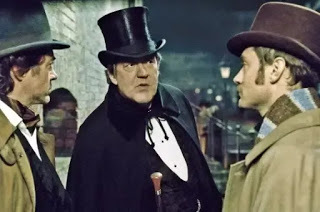
Where do you see Sherlockiana in 5 or 10 years from now?
Just as every era has the film or television Holmes that it needs, I imagine the Sherlockian community will continue to evolve to be a reflection of its time. Scholarship will continue and present us with new and creative theories about the stories and characters viewed from angles not yet considered. More pastiches, parodies, and homages will be published as the last few stories enter public domain. And with the emergence of a more participatory culture of fan-engagement, I anticipate there will be an even greater shift toward that direction (fanfic, fan art, costuming/cosplay, etc.) than we saw with BBC Sherlock when we have the next big wave of Sherlock Holmes-related media.
Despite that shift, I think there will still be plenty of room for traditional methods of engaging with the material and the literature. Ultimately, at the core of all of this activity will remain the Canon and the emphasis on the wonderful and unique friendship between its protagonists that is reflected on a daily basis in the Sherlockian community.


How do you define the word “Sherlockian”?
I’ve been a fan of Sherlock Holmes for more than 30 years and have enjoyed hundreds of different interpretations of the character in various forms of media. For me, the term Sherlockian refers to a particular breed of Sherlock Holmes fan: a student of the Canon whose knowledge is beyond the basic narrative of the stories and engages in the Great Game (which is an exercise in which we critically examine the original texts and make sense of the inconsistencies contained within, how it intersects with the real world, etc.). Based on that definition, I didn't become a "Sherlockian" until my mid/late-teens.
I recognize my definition may not be a popular one because it is a narrower in scope than some would prefer. However, I don’t see the term fan as a pejorative, and in fact, embrace it. I am a fan of lots of things ranging from sports teams (Green Bay Packers), to book series (Harry Potter), to movies (I attend several film festivals annually), and TV shows (especially the BBC sci-fi show, Doctor Who). Fan is a general term for an enthusiast, whereas Sherlockian is a very specific type of fan (kind of like all thumbs are fingers, but not all fingers are thumbs). For many years, I avoided self-applying the term Whovian, (the Doctor Who equivalent of Sherlockian) and referred to myself as a Doctor Who Fan because term/title Whovian implies a level of knowledge surrounding the character and the various facets of the Whoniverse (which extends far beyond the original and new TV series) that I didn’t possess until six or seven years ago.


A different, and perhaps more provocative, question might be “What does it mean to you to be a Sherlockian?” And in answering that question, I think it means being part of a long-standing scholarly literary community and tradition that has united people from all demographics in their love of the friendship between the great detective and his Boswell.
How did you become a Sherlockian?
I’ve told the story of how I became a Sherlock Holmes fan many times before: I was introduced to the character through a made-for-TV movie that aired in January 1987: The Return of Sherlock Holmes. My mother made me go to bed midway through the movie (I was 5 ½, after all), but I never forgot the classic pop-culture signifiers of Sherlock Holmes shown in the film. A year or two later, I came across an abridged children’s edition of The Mysteries of Sherlock Holmes on my brother’s bookshelf, which I read over and over again. And then in 1991, I came across Jeremy Brett’s Sherlock Holmes on cable’s A&E. That is when I got really hooked as a fan of the character (and of Jeremy Brett’s portrayal).

But I didn’t become a Sherlockian until the mid-90’s. One of my junior high teachers, Mrs. Patricia Cox, saw me lugging around a copy of the Canon and suggested I use a search engine on the Internet to research Swamp Adders and Tapanuli fever. When I couldn’t find much information beyond a couple of small entries from obscure scholars and links to the Sherlock Holmes stories, Mrs. Cox introduced me to the concept of the Grand Game and how Sherlockians have sought to engage in scholarly research, trying to make sense of the minutiae in the Canon and explain away the inconsistencies and other facets of the stories. This is what started me down the rabbit hole and, on the path, to becoming a Sherlockian.
What is your favorite canonical story?
The Sign of Four is my favorite. It’s the story I was obsessed with as a teen, in part because I was trying to make sense of Holmes’s use of cocaine/morphine for recreational purposes while observing my eldest brother struggle with his addiction to similar substances. My desire to make sense of Holmes’s use (and consequently, my brother’s use) forced me to go beyond the story and understand the Victorian cultural attitude towards cocaine use compared to the modern American view. I also happened to really like the story.
But there is a special place in my heart for “The Red-Headed League,” “The Blue Carbuncle,” and “The Speckled Band,” as those were the short stories to which I was first exposed as a child.
Who is a specific Sherlockian that you think others would find interesting?
While scouring Wikipedia a while back, I came across Richard H. Hoffmann, BSI (1952, The Beryl Coronet). He was a rather high-profile psychiatrist who treated several notable people for alcohol addiction, which is my specialty within the realm of mental health counseling.
Julie McKuras, BSI, ASH (who is also a Sherlockian I find incredibly interesting) did the vast majority of the heavy lifting on a biographical section on the website of the Vincent Starrett founded Sherlockian society, The Hounds of the Baskerville (sic). If you look through the members section and click the links to the biographical entries, you’ll find a British diplomat whose name appeared in Hitler’s Black Book (W.H. Gallienne), the co-inventor of the polygraph test (Leonarde Keeler), a famous magician (Jay Marshall), and a rather notable author and poet (T.S. Eliot). You’ll also find bio blurbs of some great Sherlockians both past and present on the site.

What subset of Sherlockiana really interests you?
Different Sherlockian scions and societies have a large variety of traditions and I am fascinated by learning the history of how they engage with Sherlockiana. Some groups meet once annually, some once (or more) monthly, and one meets only every four years on leap day! Some groups meet at libraries while others have elaborately planned dinners with menus that haven’t changed in decades. Some groups really study their Canon and for others, the Canon almost seems like an afterthought. To me, the how’s and why’s are truly fascinating, as it helps a younger Sherlockian like me gain an understanding and appreciation for those who came before me.
As someone who goes to more Sherlockian events than most, what would be your sales pitch for someone who is on the fence about attending an event?
When you first start out engaging in the more social aspects of the hobby, it can feel incredibly intimidating. You walk into a room filled with people who have known each other for many years and you’re the new person who knows no one; you're a little scared and worried about how you will be perceived. But, go anyway! Sherlockians tend to be some of the most welcoming and nicest people. And the vast majority are very interested in embracing new people to the hobby.

Take an opportunity to introduce yourself. Ask people questions and listen intently to their answers. Be humble, as you are on their turf and are there to learn if it is a good fit for you. If, after attending, you decide that particular group’s style doesn’t mesh with you, that’s totally okay.
Sherlockiana is a lot like the rest of life: you’re not always going to like or fit well with every group you encounter. I encourage you to not give up and to continue your search for groups or events that fit you. For example, I attended 221b Con a couple of years ago, which is more of a sci-fi convention style, fandom-focused event with a bit of traditional Sherlockiana in the mix. It’s a wonderful event and I had a lot of fun, but it’s just not my preferred way to engage with Sherlock Holmes. But that doesn’t mean others should not go and enjoy.

How has your profession as a mental health counselor influenced how you read the Canon? What things do you like to research related to Sherlock Holmes?
My core understanding of the Canon stems from a time well before I was a mental health counselor, so my professional training didn’t really start influencing interpretation of the stories until a few years ago. During BSI weekend in 2014, I had a late-night conversation with Jim Cox in which I was lamenting that so many laymen had weighed in regarding Sherlock Holmes’s use of cocaine and whether he was or was not an addict, and no one had really bothered to consult the clinical criteria. Jim suggested that I write such an essay…and I thought, “Why not?”
That is when I started to examine the Canon through a more clinical lens. Clinically and ethically, I am not allowed to twist facts to suit theories – I am limited in my ability to diagnose by what I can support from either the patient or reliable collaborative information (ex: things Holmes says or Watson observes). Therefore, I examine the text and look for passages that support, or do not support the various criteria of a diagnosis without any pre-conceived notions about the diagnostic conclusions. So, this is why, after examining the text, I learned Holmes meets DSM-5 diagnostic criteria for Cocaine Use Disorder, Severe and Watson does not meet the criteria for Problem Gambling Disorder.
Dorothy L. Sayers once wrote that the game "must be played as solemnly as a county cricket match at Lord's; the slightest touch of extravagance or burlesque ruins the atmosphere.” I’ve tried to embrace that philosophy, taking my Canonical scholarship seriously, but also welcoming dissenters and counterarguments with open arms, because that allows the conversation (and scholarship/critical thinking) to continue.
What book would you recommend to other Sherlockians?
I’m going to cheat a little on this one: I would recommend the Stephen Fry narrated audiobook of the Complete Sherlock Holmes. There’s something very soothing and comforting about his narration. I would also happily listen to Stephen Fry read names and numbers out of a phone book because I so very much love the sound of his voice. And anybody who thinks audiobooks are cheating when it comes to reading needs to check their premises – it’s different than the act of reading a book, but different does not necessarily mean bad.

Where do you see Sherlockiana in 5 or 10 years from now?
Just as every era has the film or television Holmes that it needs, I imagine the Sherlockian community will continue to evolve to be a reflection of its time. Scholarship will continue and present us with new and creative theories about the stories and characters viewed from angles not yet considered. More pastiches, parodies, and homages will be published as the last few stories enter public domain. And with the emergence of a more participatory culture of fan-engagement, I anticipate there will be an even greater shift toward that direction (fanfic, fan art, costuming/cosplay, etc.) than we saw with BBC Sherlock when we have the next big wave of Sherlock Holmes-related media.
Despite that shift, I think there will still be plenty of room for traditional methods of engaging with the material and the literature. Ultimately, at the core of all of this activity will remain the Canon and the emphasis on the wonderful and unique friendship between its protagonists that is reflected on a daily basis in the Sherlockian community.

Published on March 08, 2020 17:44
March 1, 2020
This Fellow Jones [SIGN]
Sherlock Holmes and pop culture and been mixing in my mind lately. But since I'm forty years old, it's not current pop culture; it's Indiana Jones.
Hear me out on this. I think the Indiana Jones franchise has eerie parallels to BBC's Sherlock.
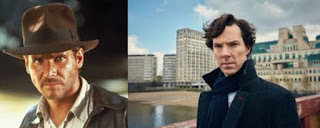
We've been threatened with a fifth installment of the Indiana Jones movies for years, and no one I know wants another one.
Pointless articles keep popping up on Facebook about a fifth season of Sherlock even though it's not going to happen and no one I know wants another one.
And the hats. Those iconic hats.
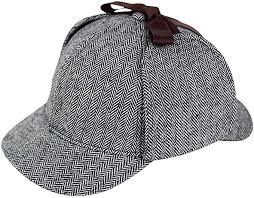
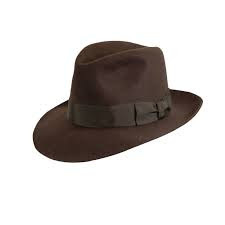
Both have had big names step away from the franchises, saying they are moving on to other projects. Cumberbatch, Ford, Moffatt, Speilberg...
Both franchises' charismatic leads took the world by storm and were instantly copied by other studios.

There are some fantastic adventures in the first three go-rounds of each.
Both franchises really should have ended after their third installments while things were still good.
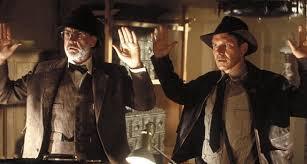
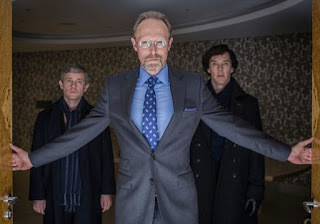
Each franchise invented a new family member for the fourth installment that took the overall arc of the franchise pretty far off the tracks. Eurus Holmes may as well have been one the Crystal Skull aliens for all she had to do with the first three seasons of Sherlock.
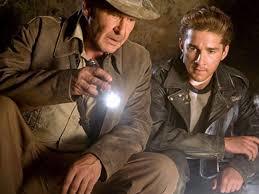

Both franchises had offshoots that left a lot of people wondering if it was necessary (Sherlock's Victorian special and the Young Indiana Jones TV series).
And finally, I refuse to recognize the fourth installment of either franchise. My headcanon ends with Moriarty on billboards and Indy riding off into the sunset with his dad.
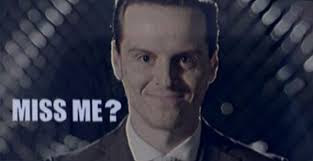

Thanks for hearing me out on this. It's important information to share with the world.
************************************************************************
P.S. After writing this, I learned that young Indiana Jones went to a seance with Arthur Conan Doyle before sailing to America on the Titanic. This is a book I think I need to read:
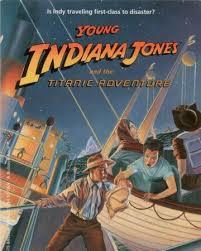
Hear me out on this. I think the Indiana Jones franchise has eerie parallels to BBC's Sherlock.

We've been threatened with a fifth installment of the Indiana Jones movies for years, and no one I know wants another one.
Pointless articles keep popping up on Facebook about a fifth season of Sherlock even though it's not going to happen and no one I know wants another one.
And the hats. Those iconic hats.


Both have had big names step away from the franchises, saying they are moving on to other projects. Cumberbatch, Ford, Moffatt, Speilberg...
Both franchises' charismatic leads took the world by storm and were instantly copied by other studios.

There are some fantastic adventures in the first three go-rounds of each.
Both franchises really should have ended after their third installments while things were still good.


Each franchise invented a new family member for the fourth installment that took the overall arc of the franchise pretty far off the tracks. Eurus Holmes may as well have been one the Crystal Skull aliens for all she had to do with the first three seasons of Sherlock.


Both franchises had offshoots that left a lot of people wondering if it was necessary (Sherlock's Victorian special and the Young Indiana Jones TV series).
And finally, I refuse to recognize the fourth installment of either franchise. My headcanon ends with Moriarty on billboards and Indy riding off into the sunset with his dad.


Thanks for hearing me out on this. It's important information to share with the world.
************************************************************************
P.S. After writing this, I learned that young Indiana Jones went to a seance with Arthur Conan Doyle before sailing to America on the Titanic. This is a book I think I need to read:

Published on March 01, 2020 15:31
February 17, 2020
No Peace in Life [WIST]
This weekend was the latest meeting for the Jefferson Hopes of St. Louis scion and our topic was "The Illustrious Client." Each member is expected to bring some kind of presentation for the meeting. We had a lot of great discussions on quotes from the story, Violet DeMerville, China saucers, Marleybone road, and plenty of other subtopics.
I chose to focus on Charlie Peace. If you're not familiar with this name, it comes up in a "blink and you'll miss it" line where Holmes mentions that even criminals have admirable qualities. Charles Peace was a true life criminal, arrested repeatedly for burglary and convicted of two murders. Whole books have been written about him, but a quick scan of his Wikipedia page can give you some more details.
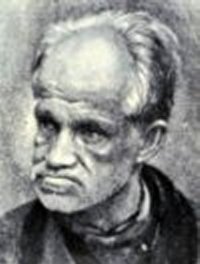
Coincidentally, I came across an article on Peace in the 1966 Spring Baker Street Journal that I sat down with yesterday afternoon. Author Franklin Rhode tried to pinpoint where Holmes and Peace would have met and offers a few theories in the BSJ. As you can see in my following paper, I strongly disagree with Rhode's theories.
Old Friends or Overstatements?
“My old friend Charlie Peace was a violin virtuoso,” Sherlock Holmes says during “The Illustrious Client” in 1902. By then, Charles Peace had been dead for 23 years, having been executed in 1879. But what was the relation between Holmes and Peace? Or was a relationship even possible?
If Peace was executed in 1879 that leaves very little time for Holmes to get to know him personally. According to most chronologists, Holmes didn’t begin studying detection until 1877 or 1878. Burglar and murderer Charles Peace was widely known throughout England at the time, as the police force spent months looking for him. Peace stayed constantly on the move, often changing his appearance to keep police off the scent. Of course, Holmes would have read about this manhunt in the papers of the day. Peace was eventually caught during a burglary in 1878 and his trial was a major event. But these dates shorten the window even more, as I doubt Holmes could have made the acquaintance of Peace while he was on the lam.
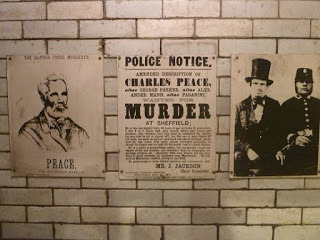
So, could Sherlock Holmes have become “old friends” with Charlie Peace in between his final capture and execution date? Even if Holmes had tried to visit Peace in jail in the two years before his execution, would this young man fresh from college have been given passage to such a prolific criminal? I doubt it.
More likely, Holmes studied Peace’s methods, specifically those of disguise and safecracking that would come in handy later on in his detective career. Perhaps even Peace’s face was part of Holmes’s “pictures of celebrated criminals with which every wall was adorned” in his Baker Street bedroom in later years [DYIN].
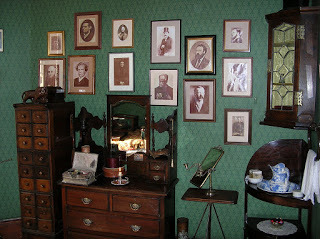
There were many times that Holmes spoke in admiration of criminals. Moriarty, or course, but he also referred to a child murderer as a “winning woman” [SIGN] and called John Clay “the fourth smartest man in London” [REDH]. So why wouldn’t Holmes respect Peace, who on top of all of his criminal activity, also had a history of playing violin on stage in his younger days?
As we’ve seen many times, you can’t always take Sherlock Holmes at face value. I argue that Holmes is being facetious in his meeting with Sir James Damery. Not his best look, as Damery is attempting to stop one of the vilest men in the entire Canon.
*****
On a lighter note, one of my friends texted me last night to point out that Charles Peace reminds him of Brain from Pinky and the Brain. You be the judge:
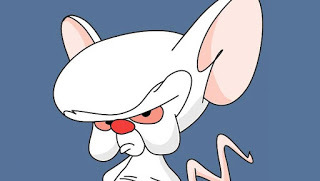
I chose to focus on Charlie Peace. If you're not familiar with this name, it comes up in a "blink and you'll miss it" line where Holmes mentions that even criminals have admirable qualities. Charles Peace was a true life criminal, arrested repeatedly for burglary and convicted of two murders. Whole books have been written about him, but a quick scan of his Wikipedia page can give you some more details.

Coincidentally, I came across an article on Peace in the 1966 Spring Baker Street Journal that I sat down with yesterday afternoon. Author Franklin Rhode tried to pinpoint where Holmes and Peace would have met and offers a few theories in the BSJ. As you can see in my following paper, I strongly disagree with Rhode's theories.
Old Friends or Overstatements?
“My old friend Charlie Peace was a violin virtuoso,” Sherlock Holmes says during “The Illustrious Client” in 1902. By then, Charles Peace had been dead for 23 years, having been executed in 1879. But what was the relation between Holmes and Peace? Or was a relationship even possible?
If Peace was executed in 1879 that leaves very little time for Holmes to get to know him personally. According to most chronologists, Holmes didn’t begin studying detection until 1877 or 1878. Burglar and murderer Charles Peace was widely known throughout England at the time, as the police force spent months looking for him. Peace stayed constantly on the move, often changing his appearance to keep police off the scent. Of course, Holmes would have read about this manhunt in the papers of the day. Peace was eventually caught during a burglary in 1878 and his trial was a major event. But these dates shorten the window even more, as I doubt Holmes could have made the acquaintance of Peace while he was on the lam.

So, could Sherlock Holmes have become “old friends” with Charlie Peace in between his final capture and execution date? Even if Holmes had tried to visit Peace in jail in the two years before his execution, would this young man fresh from college have been given passage to such a prolific criminal? I doubt it.
More likely, Holmes studied Peace’s methods, specifically those of disguise and safecracking that would come in handy later on in his detective career. Perhaps even Peace’s face was part of Holmes’s “pictures of celebrated criminals with which every wall was adorned” in his Baker Street bedroom in later years [DYIN].

There were many times that Holmes spoke in admiration of criminals. Moriarty, or course, but he also referred to a child murderer as a “winning woman” [SIGN] and called John Clay “the fourth smartest man in London” [REDH]. So why wouldn’t Holmes respect Peace, who on top of all of his criminal activity, also had a history of playing violin on stage in his younger days?
As we’ve seen many times, you can’t always take Sherlock Holmes at face value. I argue that Holmes is being facetious in his meeting with Sir James Damery. Not his best look, as Damery is attempting to stop one of the vilest men in the entire Canon.
*****
On a lighter note, one of my friends texted me last night to point out that Charles Peace reminds him of Brain from Pinky and the Brain. You be the judge:

Published on February 17, 2020 09:47
February 9, 2020
Interesting Interview: Bob Katz
If you've been to an official BSI event, or any Sherlockian event on the eastern seaboard, you've probably seen Bob Katz there. You are right in thinking that he is under the BSI. You would also be right in a sense if you said that occasionally he is the - well, maybe that's taking things too far. But Bob has been around long enough to have seen the growth of our hobby and be at the forefront of welcoming new Sherlockians into the fold over the past few decades.
If you own a book by BSI Publishing, Bob's been involved in it. If you're a member of a scion in one of the original 13 states, Bob has probably visited (and plenty inland as well). If you've ever wondered how the American Civil War affected Sherlock Holmes, Bob is the man to have a drink with.
But here's the thing: it would be very easy for Bob Katz to sit up in some Sherlockian ivory tower, but he's a wrecking ball of personality. Bob will be one of the first people to stick out his hand and introduce himself to a new face at a Sherlockian gathering. Case in point, he was one of two speakers at my first Sherlockian event, Nerve and Knowledge, years back. I am not an outgoing person, but by the end of the night, we were at a table talking about book projects and why his son prefers Under Armor over Nike. Bob just has a way of pulling you into his orbit. I don't know if Bob Katz has ever met a stranger, and if you haven't had a chance to meet Dr. Katz, now's your time.
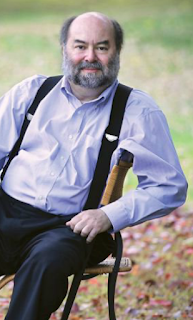
How do you define the word “Sherlockian”?
I try to keep this one simple. Anyone who is interested in Sherlock Holmes is a Sherlockian. I don't try to make distinctions or conditions. If you like Sherlock Holmes, that's good enough for me. We'll find something to discuss.
How did you become a Sherlockian?
I was introduced to Sherlock Holmes via a rainy Saturday afternoon viewing of a Rathbone film (I think "House of Fear") on local New York television. I was so enthralled by it that I dashed out of the house after the film ended and practically ran to the local library to find the stories in print. Once I had read the stories, I happened to come across Baring-Gould's biography "Sherlock Holmes of Baker Street" in a remainder pile in a NY bookstore. For me, the best part of the book was the bibliography at the end of the book. I learned about the "Baker Street Journal" and several of the cornerstone works of Higher Criticism. I was able to find copies of most through the local libraries and had read quite a bit by the time I finished high school.
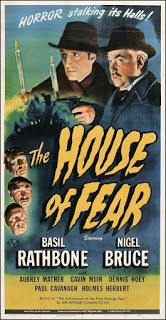
Fortuitously (and without foreknowledge of the fact), I attended Haverford College, which was the alma mater of BSI founder, Christopher Morley. There was a reading alcove in the library named for him, replete with a comfortable sofa, and surrounding bookcases containing Morley's writings. I managed to intersperse Canonical commentary and my official studies throughout college. While in medical school, I came across an article about a running of the NY Silver Blaze race, which identified Julian Wolff as the leader of the BSI. I wrote to him and he replied with a suggestion that I subscribe to the BSJ. That brought me into contact with the wider Sherlockian world.
After finishing school and internship, I landed in Philadelphia for my residency training. By then, I had the time to join a Scion Society (The Master's Class, then chaired by our current BSI leader/Wiggins, Michael Kean). I became involved in their activities and things just spiraled from there. Even though I was in my mid-twenties, everyone treated me with great kindness and friendship. I knew I was in the right place.
What is your favorite canonical story?
I've always had a soft spot for "The Dying Detective". It's the most medical of the stories, takes place in the shortest time frame, has a truly malevolent villain, and a surprise ending. I was thrilled when I received the BSI investiture of "Dr. Ainstree", which is taken from that story.
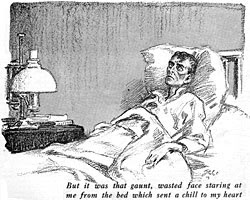
Who is a specific Sherlockian that you think others would find interesting?
That's a really hard question. It's rare for me to meet a Sherlockian who isn't interesting. Sherlockians are the most well-read people I know. Their breadth and depth of knowledge on a huge variety of subjects is immensely impressive.
Of course, we're all interested in the early pillars of the Sherlockian world--Smith, Morley, Starrett, followed by Shaw, Wolff, Stix and so many others. Rather than pick just one individual, I'd rather focus on who has real meaning to me. One of the great pleasures of my life is sitting down to dinner with a small group of Sherlockians. It's great if they are old friends. It's great if they are people I've just met. We have so many shared experiences; so many shared interests; so many divergent, overlapping and/or different views. Spending a few hours in that surrounding is what epitomizes the Sherlockian experience and I'm perpetually interested in what others have to say.
What subset of Sherlockiana really interests you? What things do you like to research related to Sherlock Holmes?
I'll cover these together and largely defer to the question below. I've always been interested in the medical aspects of the Canon, along with the life of Dr. Watson. To a great extent, my choice of careers was influenced by the Canon. A detective makes deductions. A doctor makes diagnoses. It's the same process. As a result, most of my own research has been medically-oriented. But from time to time, my other lifelong interest, the American Civil War, sometimes creeps into my Sherlockian writing. But without Watson, we'd never know about Holmes.
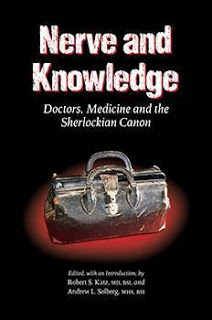
How did you become involved with editing the BSI Press and how has it changed during your tenure?
Like so many things in life, my initial involvement with BSI Books came about by serendipity. At the BSI Dinner some years back, Andrew Fusco (Series Editor of the Manuscript Series) approached my dear friend, Andrew Solberg about editing "The Golden Pince-Nez" manuscript. Andy S had too many professional obligations and declined. Later that evening, Andy F asked me if I could take this on. I was getting ready to retire, but was still too busy to accept. A few minutes later, Andy S and I were seated together at the Dinner. We'd been close friends for decades and realized that if we worked together, we could do the book. So we walked across the Ballroom and offered to co-edit. Andy Fusco graciously accepted.
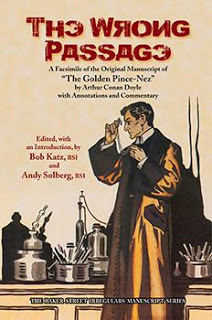
That started a collaboration that produced four books for the Manuscript Series and a stand alone book about Medicine in the Canon. Working with the entire BSI Press team has been one of the most fulfilling aspects of my Sherlockian journey. After handling several books, Michael Kean (who was then BSI Press Co-Publisher along with John Bergquist) asked me if I would succeed him as Co-Publisher and Acquisitions Editor. For some inexplicable reason, Mike K thought I was thorough and detail-oriented. Mike himself was getting ready to become the next Wiggins and facilitated the transition to my tenure.
I think it is more accurate to say the BSI Press has evolved rather than changed. It was started by Mike Whelan with a small number of publications. Over time, we've become a busier organization, with a substantial number of publications on a regular basis. The format of the books has become more standardized, which enables us to maintain the quality of the contributions. As the books gained wider distribution, more and more Sherlockians wanted to contribute to our books. This has widened the pool of talent available to us and attracted people with a wide range of backgrounds, knowledge bases, and skill sets. I'm very pleased with what we've been able to do over the years and know that we already have many new books in active production and development.
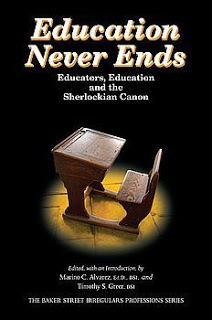
How have your years in the medical field influenced your appreciation of the Canon?
It's worked both ways for me. My reading of the Canon helped me to make a career choice. Once I was in medical school, my choice of a specialty (Pathology) was affected by aspects of the Canon. The Canon was written by a physician (Conan Doyle or Watson---take your pick). Joseph Bell was a role model. So many of the stories have significant medical facets. Holmes and Watson are introduced to each other by a physician, in a hospital laboratory. It's a pleasure and a privilege to be able to read the Canon through the eyes and perspective of a physician.
Although years apart, both Watson and I shared a common educational experience and share a common world view. It's just something that becomes a part of our DNA over time. Both the Canon and the medical profession somehow "make sense" to me. It was thrilling to have the opportunity to work with Andy Solberg on "Nerve and Knowledge" as we're both in health care and we were able to put all our years of experience to work in discussing medicine in the Canon.
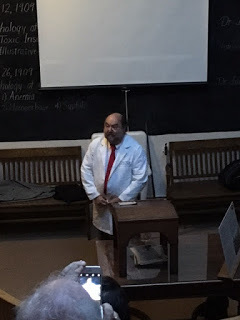
What book would you recommend to other Sherlockians?
Can't pick just one---and why limit it. The Sherlockian literature expands and improves continually. Anything by Morley, Starrett, and Smith is a great starting point. The various annotated versions (both Baring-Gould and Klinger) make repealed readings of the Canon so much more fulfilling. Mattias Bostrom and Michael Sims have widened our horizons lately. Conan Doyle biographies got off to a good start with Carr, and Stashower and Lycett have added to our knowledge. The BSI Press Manuscript Series (and yes I'm biased) provides a unique view into the creative process. Nick Meyer turned our world upside down, and for the better, with 7%.
And when you run out of new books to read, just go back to the Canon. The Holmes stories have become a phenomenon because they get better with each re-reading. Some overlooked detail, some subtle nuance, some plot twist---these all become apparent anew each time you read the stories.
Where do you see Sherlockiana in 5 or 10 years from now?
There have been so many sentinel events that rock the Sherlockian world every few years---Gillette on stage, Rathbone on film, Brett on television. 7% reinventing the concept of the pastiche. BBC Sherlock dazzling us and proving that there's always a new way to look at things. And that's a limited list of everything that has influenced the Sherlocian universe.
Social media has added an entirely new dimension. So I don't exactly know how the Sherlockian world will look in five or ten years. But then, that actually doesn't matter. What counts, and I am absolutely positively certain of this, is that there will be Sherlockiana in five years, ten years, and beyond. It will bear similarities to the present. It will be radically different. But there will be a fixed point in the changing of the ages. The characters of Holmes and Watson, the relationship between Holmes and Watson, the sophistication of the studies involving Holmes and Watson----these will be the bedrock of the field.
And of perhaps equal importance, the friendships and relationships that are the glue of our unique society will be as strong as they have always been. All of that sustains us and impels us to take Sherlockiana into new and creative directions. Is there anything better than being a Sherlockian?
If you own a book by BSI Publishing, Bob's been involved in it. If you're a member of a scion in one of the original 13 states, Bob has probably visited (and plenty inland as well). If you've ever wondered how the American Civil War affected Sherlock Holmes, Bob is the man to have a drink with.
But here's the thing: it would be very easy for Bob Katz to sit up in some Sherlockian ivory tower, but he's a wrecking ball of personality. Bob will be one of the first people to stick out his hand and introduce himself to a new face at a Sherlockian gathering. Case in point, he was one of two speakers at my first Sherlockian event, Nerve and Knowledge, years back. I am not an outgoing person, but by the end of the night, we were at a table talking about book projects and why his son prefers Under Armor over Nike. Bob just has a way of pulling you into his orbit. I don't know if Bob Katz has ever met a stranger, and if you haven't had a chance to meet Dr. Katz, now's your time.

How do you define the word “Sherlockian”?
I try to keep this one simple. Anyone who is interested in Sherlock Holmes is a Sherlockian. I don't try to make distinctions or conditions. If you like Sherlock Holmes, that's good enough for me. We'll find something to discuss.
How did you become a Sherlockian?
I was introduced to Sherlock Holmes via a rainy Saturday afternoon viewing of a Rathbone film (I think "House of Fear") on local New York television. I was so enthralled by it that I dashed out of the house after the film ended and practically ran to the local library to find the stories in print. Once I had read the stories, I happened to come across Baring-Gould's biography "Sherlock Holmes of Baker Street" in a remainder pile in a NY bookstore. For me, the best part of the book was the bibliography at the end of the book. I learned about the "Baker Street Journal" and several of the cornerstone works of Higher Criticism. I was able to find copies of most through the local libraries and had read quite a bit by the time I finished high school.

Fortuitously (and without foreknowledge of the fact), I attended Haverford College, which was the alma mater of BSI founder, Christopher Morley. There was a reading alcove in the library named for him, replete with a comfortable sofa, and surrounding bookcases containing Morley's writings. I managed to intersperse Canonical commentary and my official studies throughout college. While in medical school, I came across an article about a running of the NY Silver Blaze race, which identified Julian Wolff as the leader of the BSI. I wrote to him and he replied with a suggestion that I subscribe to the BSJ. That brought me into contact with the wider Sherlockian world.
After finishing school and internship, I landed in Philadelphia for my residency training. By then, I had the time to join a Scion Society (The Master's Class, then chaired by our current BSI leader/Wiggins, Michael Kean). I became involved in their activities and things just spiraled from there. Even though I was in my mid-twenties, everyone treated me with great kindness and friendship. I knew I was in the right place.
What is your favorite canonical story?
I've always had a soft spot for "The Dying Detective". It's the most medical of the stories, takes place in the shortest time frame, has a truly malevolent villain, and a surprise ending. I was thrilled when I received the BSI investiture of "Dr. Ainstree", which is taken from that story.

Who is a specific Sherlockian that you think others would find interesting?
That's a really hard question. It's rare for me to meet a Sherlockian who isn't interesting. Sherlockians are the most well-read people I know. Their breadth and depth of knowledge on a huge variety of subjects is immensely impressive.
Of course, we're all interested in the early pillars of the Sherlockian world--Smith, Morley, Starrett, followed by Shaw, Wolff, Stix and so many others. Rather than pick just one individual, I'd rather focus on who has real meaning to me. One of the great pleasures of my life is sitting down to dinner with a small group of Sherlockians. It's great if they are old friends. It's great if they are people I've just met. We have so many shared experiences; so many shared interests; so many divergent, overlapping and/or different views. Spending a few hours in that surrounding is what epitomizes the Sherlockian experience and I'm perpetually interested in what others have to say.
What subset of Sherlockiana really interests you? What things do you like to research related to Sherlock Holmes?
I'll cover these together and largely defer to the question below. I've always been interested in the medical aspects of the Canon, along with the life of Dr. Watson. To a great extent, my choice of careers was influenced by the Canon. A detective makes deductions. A doctor makes diagnoses. It's the same process. As a result, most of my own research has been medically-oriented. But from time to time, my other lifelong interest, the American Civil War, sometimes creeps into my Sherlockian writing. But without Watson, we'd never know about Holmes.

How did you become involved with editing the BSI Press and how has it changed during your tenure?
Like so many things in life, my initial involvement with BSI Books came about by serendipity. At the BSI Dinner some years back, Andrew Fusco (Series Editor of the Manuscript Series) approached my dear friend, Andrew Solberg about editing "The Golden Pince-Nez" manuscript. Andy S had too many professional obligations and declined. Later that evening, Andy F asked me if I could take this on. I was getting ready to retire, but was still too busy to accept. A few minutes later, Andy S and I were seated together at the Dinner. We'd been close friends for decades and realized that if we worked together, we could do the book. So we walked across the Ballroom and offered to co-edit. Andy Fusco graciously accepted.

That started a collaboration that produced four books for the Manuscript Series and a stand alone book about Medicine in the Canon. Working with the entire BSI Press team has been one of the most fulfilling aspects of my Sherlockian journey. After handling several books, Michael Kean (who was then BSI Press Co-Publisher along with John Bergquist) asked me if I would succeed him as Co-Publisher and Acquisitions Editor. For some inexplicable reason, Mike K thought I was thorough and detail-oriented. Mike himself was getting ready to become the next Wiggins and facilitated the transition to my tenure.
I think it is more accurate to say the BSI Press has evolved rather than changed. It was started by Mike Whelan with a small number of publications. Over time, we've become a busier organization, with a substantial number of publications on a regular basis. The format of the books has become more standardized, which enables us to maintain the quality of the contributions. As the books gained wider distribution, more and more Sherlockians wanted to contribute to our books. This has widened the pool of talent available to us and attracted people with a wide range of backgrounds, knowledge bases, and skill sets. I'm very pleased with what we've been able to do over the years and know that we already have many new books in active production and development.

How have your years in the medical field influenced your appreciation of the Canon?
It's worked both ways for me. My reading of the Canon helped me to make a career choice. Once I was in medical school, my choice of a specialty (Pathology) was affected by aspects of the Canon. The Canon was written by a physician (Conan Doyle or Watson---take your pick). Joseph Bell was a role model. So many of the stories have significant medical facets. Holmes and Watson are introduced to each other by a physician, in a hospital laboratory. It's a pleasure and a privilege to be able to read the Canon through the eyes and perspective of a physician.
Although years apart, both Watson and I shared a common educational experience and share a common world view. It's just something that becomes a part of our DNA over time. Both the Canon and the medical profession somehow "make sense" to me. It was thrilling to have the opportunity to work with Andy Solberg on "Nerve and Knowledge" as we're both in health care and we were able to put all our years of experience to work in discussing medicine in the Canon.

What book would you recommend to other Sherlockians?
Can't pick just one---and why limit it. The Sherlockian literature expands and improves continually. Anything by Morley, Starrett, and Smith is a great starting point. The various annotated versions (both Baring-Gould and Klinger) make repealed readings of the Canon so much more fulfilling. Mattias Bostrom and Michael Sims have widened our horizons lately. Conan Doyle biographies got off to a good start with Carr, and Stashower and Lycett have added to our knowledge. The BSI Press Manuscript Series (and yes I'm biased) provides a unique view into the creative process. Nick Meyer turned our world upside down, and for the better, with 7%.
And when you run out of new books to read, just go back to the Canon. The Holmes stories have become a phenomenon because they get better with each re-reading. Some overlooked detail, some subtle nuance, some plot twist---these all become apparent anew each time you read the stories.
Where do you see Sherlockiana in 5 or 10 years from now?
There have been so many sentinel events that rock the Sherlockian world every few years---Gillette on stage, Rathbone on film, Brett on television. 7% reinventing the concept of the pastiche. BBC Sherlock dazzling us and proving that there's always a new way to look at things. And that's a limited list of everything that has influenced the Sherlocian universe.
Social media has added an entirely new dimension. So I don't exactly know how the Sherlockian world will look in five or ten years. But then, that actually doesn't matter. What counts, and I am absolutely positively certain of this, is that there will be Sherlockiana in five years, ten years, and beyond. It will bear similarities to the present. It will be radically different. But there will be a fixed point in the changing of the ages. The characters of Holmes and Watson, the relationship between Holmes and Watson, the sophistication of the studies involving Holmes and Watson----these will be the bedrock of the field.
And of perhaps equal importance, the friendships and relationships that are the glue of our unique society will be as strong as they have always been. All of that sustains us and impels us to take Sherlockiana into new and creative directions. Is there anything better than being a Sherlockian?
Published on February 09, 2020 14:43



